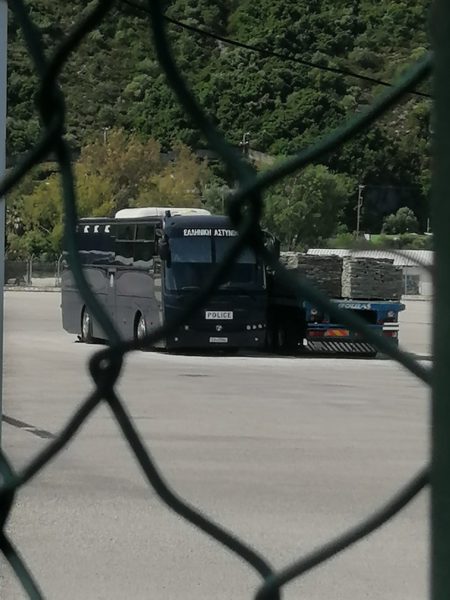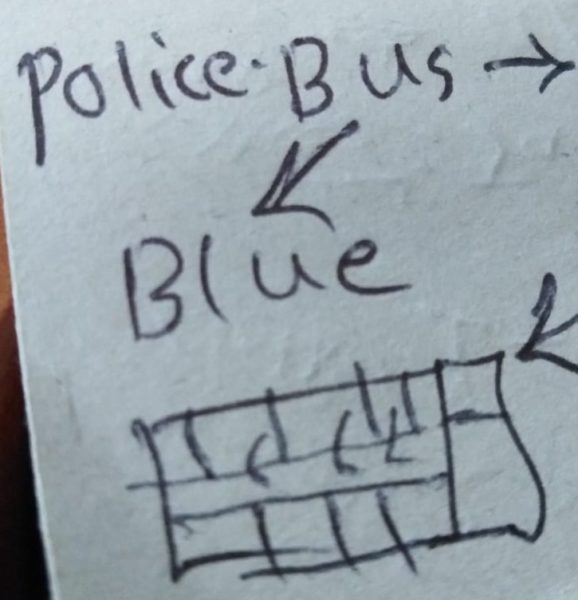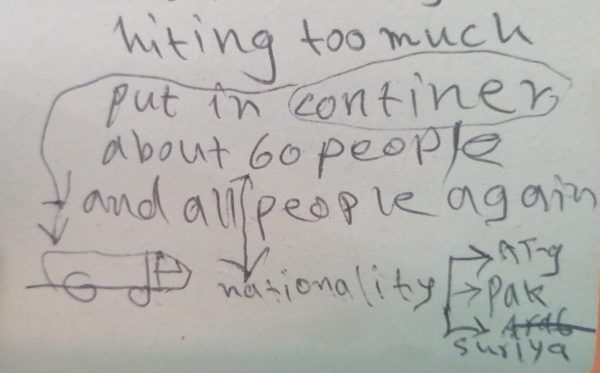A new practice in Northern Greece - from Igumenitsa to Turkey
| 05.03.2020 | Feres | No Name Kitchen | 40.7427902, 26.0410116 | Greece | Turkey | no | no | yes | no | no | no | 23 - 23 | 60 | Afghanistan, Pakistan, Syria | detention, no translator present, denial of access to toilets, denial of food/water | 17 | beating (with batons/hands/other), kicking, insulting, electric shock, forcing to undress, destruction of personal belongings, theft of personal belongings | <p>Igumenitsa: 5 officers in plain clothes plus the captain; 2 police officers driving the van; 3 officer in border uniform; 6 officers in army officers</p> |
The respondent is an asylum seeker in Greece who arrived to the country towards the end of 2019. He asked for asylum in Filakio; he also states that he spent several months in Drama centre. On the 3rd of May at approximately 00:00 midnight, the respondent, along with two other people, were going to buy some food in a 24 hour grocery shop in Igoumenitsa. Within the group, there was a man who had been waiting for official papers in Greece for just 20 days. They were celebrating Ramadan. People-on-the-move staying in the city often live in a forest which is colloquially referred to as the “jungle”. It is a bit outside the city centre, but near to the main gate of the Port (see picture). When the men came to the inner-city area for their errand, they were stopped by “private security”. The transit group could not see them well because they were in a car with black windows. According to the respondent, the “private security” wore civilian clothing: one of them was in red jacket, blue pants and wearing a cap. They said: “Come with us” and detained the group. When the respondent asked where they were taking them, the “security guy” answered that they would send them to Athens. They were then brought to a building which the respondents described as “commando house”. At this building, there were an additional 14 people who had been arrested within the city that evening. The group were detained for one or two hours later, a vehicle arrived to the building. The respondent described it as follows: “Like a bus, blue color, a jail car, with separate cells which you cannot run away from. When you are inside, you cannot see outside” “Door is lock, door is lock, door is lock” (see drawing). The group were put in the van, two police officers were driving, and were then driven for around 10 hours. [caption id="attachment_14652" align="aligncenter" width="450"] An image obtained of the "jail car" which the respondent described as transporting the group to the Turkish border[/caption] [caption id="attachment_14653" align="aligncenter" width="261"]
An image obtained of the "jail car" which the respondent described as transporting the group to the Turkish border[/caption] [caption id="attachment_14653" align="aligncenter" width="261"] A drawing of the "jail car"[/caption] According to the respondent, the bus transported them all the way back to the border with Turkey, but they were still on the Greek side (see map). When they were told to exit the vehicle, three Greek police officers were outside: two male and one female, wearing border police uniforms. The female officer had an electric taser and she was described as shocking the individuals of the group as they exited the van. The other officers physically hit the group as they left the vehicle. Afterwards, they “put them in jail” near the border for between 5 and 6 hours. Next, an officer wearing an army uniform arrived to their cell and asked the group for their money; he also broke their phones and started to “hit too much”. The respondent further described that they were ordered to give over much of their clothing and some people had their papers torn up. “There is a room like commando where they wear black mask” (balaclavas). There, they took the clothes even the shoes, just having the shorts, they hit again.”
A drawing of the "jail car"[/caption] According to the respondent, the bus transported them all the way back to the border with Turkey, but they were still on the Greek side (see map). When they were told to exit the vehicle, three Greek police officers were outside: two male and one female, wearing border police uniforms. The female officer had an electric taser and she was described as shocking the individuals of the group as they exited the van. The other officers physically hit the group as they left the vehicle. Afterwards, they “put them in jail” near the border for between 5 and 6 hours. Next, an officer wearing an army uniform arrived to their cell and asked the group for their money; he also broke their phones and started to “hit too much”. The respondent further described that they were ordered to give over much of their clothing and some people had their papers torn up. “There is a room like commando where they wear black mask” (balaclavas). There, they took the clothes even the shoes, just having the shorts, they hit again.”
[caption id="attachment_14655" align="aligncenter" width="600"]
The respondent described being held in a container immediately before being pushed back. He believed that this detention location may have been where the arrow designates[/caption]
Afterwards they were brought to a “container like those of trailer” on foot (see drawing). There were around 60 other people, among them were Afghan, Pakistani, and Syrian nationals. The respondent recalled that they were “close to die because the lack of oxygen, you know, container is locked”. Eventually, they were all brought out of this container and were brought even closer to the border, next to the Evros river. At this point 6 officers clad in army-like fatigues beat them with batons.
“Break hands, break legs, hit too much”.
Close to the river, they put them “in plastic boats”; around 30 - 35 people in each boat. The respondent described them as "commando boats." “Commando boat, they have them in the border”. During this time, the respondent recalled that the Greek authorities were looking around to make sure that there were no witnesses to the events, such as Turkish border police. They sent the boat across the river to Turkish territory, towards the other side of the Evros river, with the help of what the respondent described as a non-Greek person.
“There is a place, forest, we put out in the wood. The weather was warm, too much mosquito”
In Turkey, the group became fractured and the respondent walked almost a half a day to reach a small city in Turkey, without shoes and clothes. They only had on their t-shirts and underwear and were afraid that they would be arrested again.
“We walked, walked, walked, we were in shock.”
The respondent recalled that they continued walking and at one point entered a forested area. Several Turkish police officers found the respondent and his companions and they brought them to place which was described as “when people [get] pushed back, [they] bring here”. The location of this camp remains undetermined. At the time of the interview, the respondent and the group are still in Turkey.

